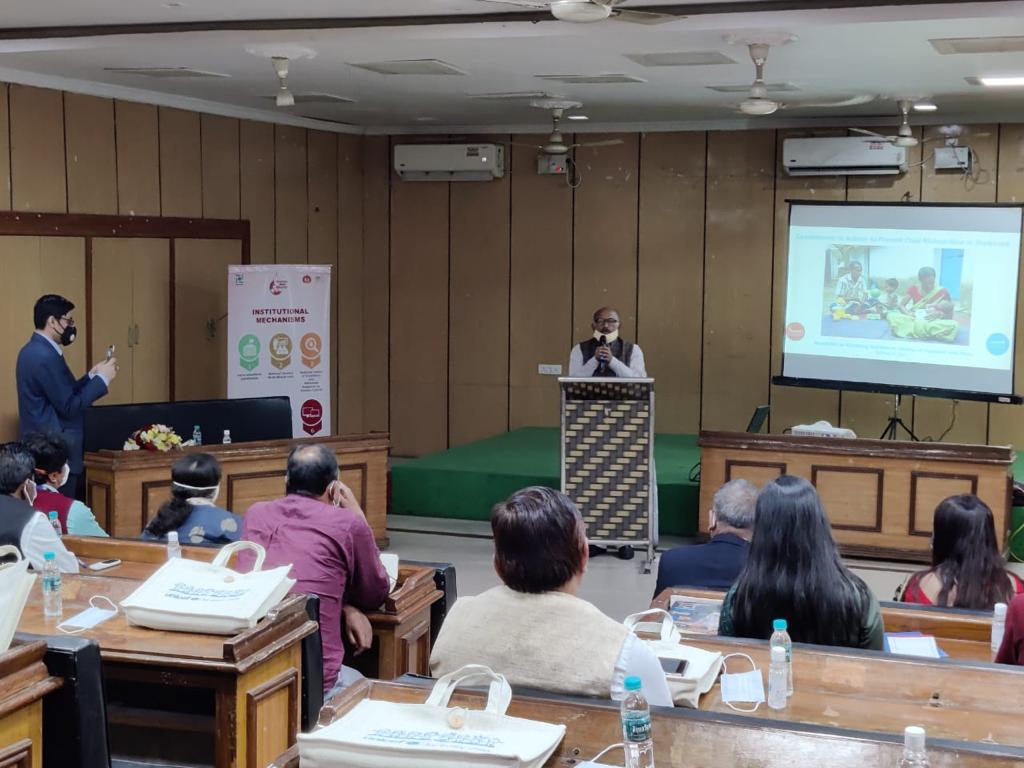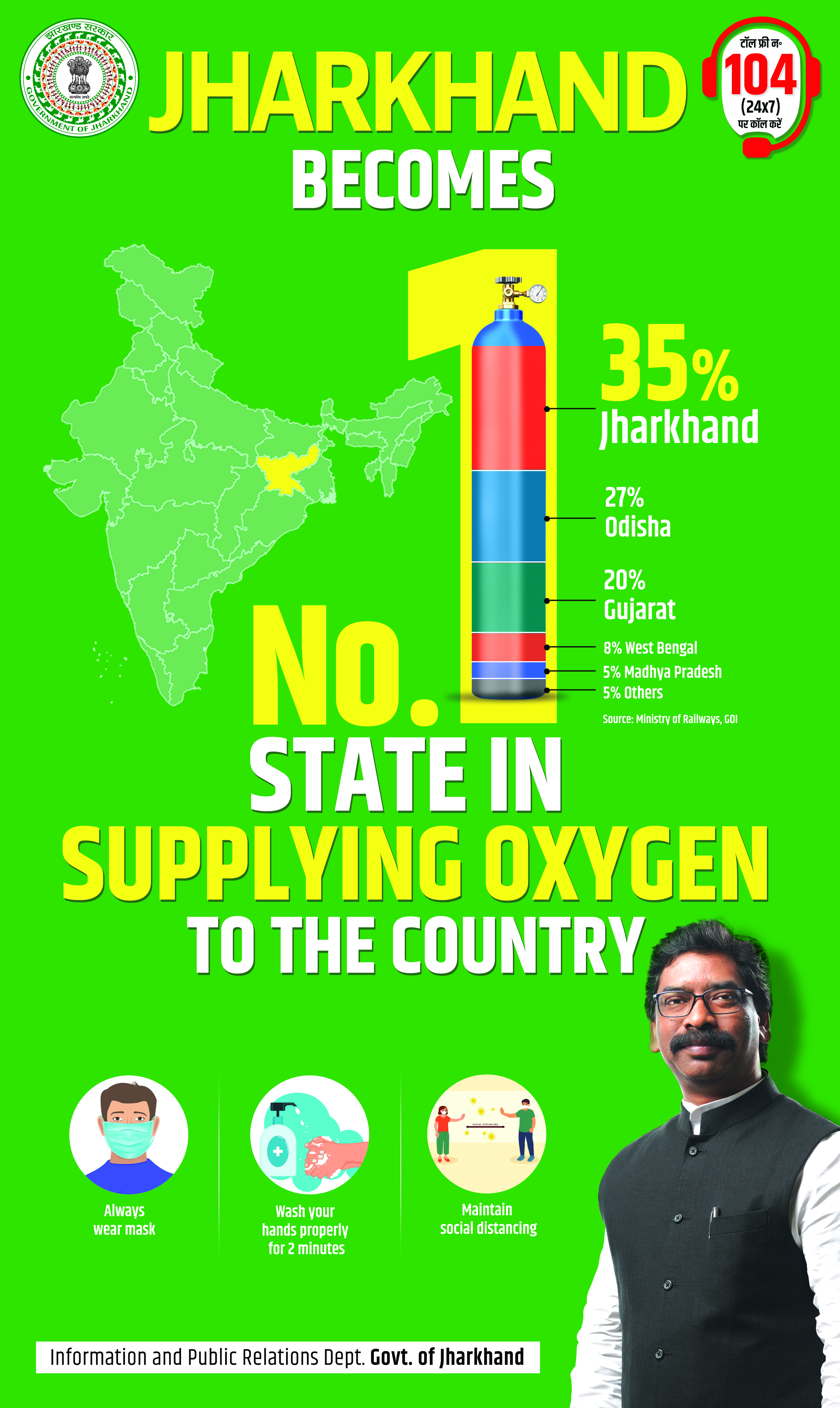
Children are the barometer of a society’s wellbeing. A child’s wellbeing in all aspects of her/his life reflects the overall health and development of the family, community and society they live in. And a very important indicator of whether things are going in the right or wrong direction is in the measure of the nutritional status of our young citizens. A nation and states’ far-reaching impact is seen very often from a child’s wellbeing and the health index.
In India, about half of all children under five in India have malnutrition. Jharkhand has the highest prevalence of undernutrition in children – 43% are underweight while 29% suffer from Acute Malnutrition.
They are too thin, or too short for their age because they didn’t get the required nutrients to fully grow their body, grow their immune system and to grow their brain to full potential. Keeping this in mind, UNICEF Jharkhand organised a roundtable with 13 MLAs to inform on the malnutrition of children. Hon’ble Speaker of Vidhan Sabha, Shri Rabindranath Mahato graced the occasion as the Chief Guest in the roundtable.

Speaking on this occasion, the Honourable Speaker of Vidhan Sabha, Shri Rabindranath Mahato said, “Nutrition of children & pregnant women and their health is one of the priorities of the State. The pandemic induced lockdown has proven to be one of the most disruptive events thus far, making our task more challenging but we are focused to work for the health and nutrition of children. We have to utilise this opportunity to come together in our efforts of reducing malnutrition cases in Jharkhand and address the critical challenges.”

While addressing the roundtable, the Hon’ble Speaker further said, “The first 1000 days since the conception of a child is crucial for averting lifelong health risks for an individual, which reduces the burden on the public health infrastructure in the long run. A healthier, disease resilient youth population also implies better human capital for sustained economic growth and overall state development. We should invest in programmes and schemes that improve the health and nutrition outcome of our future generations. We must engage with multiple stakeholders and coordinate our efforts at the district, panchayat and constituency level to improve the coverage and quality of service delivery in health, nutrition, public sanitation, education and women empowerment.”

Speaking at the interaction, Mr Prasanta Dash, Chief of Field Office, UNICEF Jharkhand said, “We need to remember that children are the future of the state. We need to reimagine a better future for them. From its onset, UNICEF has been drawing attention to the pandemic as a child rights crisis. The pandemic has also posed a risk of malnutrition to more children due to interruptions in essential services including nutrition, and the socioeconomic shocks caused by the pandemic. It’s time for reflection, action and deploying indigenous solutions. The causes of malnutrition may be complex and there is no silver bullet for achieving quick results.”
Talking about solutions for reducing malnutrition, Mr Prasanta Dash further said, “Successful malnutrition reduction can come primarily from improvements in the following three areas: Delivery of high impact health and nutrition interventions, especially to pregnant women and young children; Equity-enhancing social programmes to reduce poverty and improve food security, as well as consistent economic growth; Investments in girls and women throughout their lives, ensuring that girls stay in school that helps them realize their core rights.”
Hon’ble Members of Jharkhand Vidhan Sabha namely, Shri Samir Kumar Mohanty from JMM party, Baharagora constituency, Shri Umashankar Akela from Congress party, Barhi constituency, Kumari Amba Prasad from Congress party, Hazaribagh constituency, Shri Amit Kumar Yadav (Independent), Barkatha constituency, Shri Vinod Kumar Singh from CPI(M) party, Bagodar constituency, Shri Raj Sinha from Bharatiya Party, Dhanbad Constituency, Shri Amit Kumar Mandal from Bharatiya Party, Godda Constituency, Shri. Lambodar Mahto, AJSU Party, Gomia Constituency, Shri. Navin Jaiswal from Bharatiya Janata Party, Hatiya Constituency, Shri. Manish Jaiswal from Bharatiya Janata Party, Hazaribagh Constituency, Shri. Bandhu Tirkey from JVM(P) Party, Mandar Constituency, Shri. Mangal Kalindi from JMM Party, Jugsalai Constituency and Shri. Kishun Kumar Das from Bharatiya Janata Party, Simaria Constituency participated in the interaction.
Ms Astha Alang, Communication, Advocacy and Partnership Officer, UNICEF Jharkhand, Ms Preetu Mishra, Nutrition Specialist and Dr Rahul Shaligramji Kapse, Health Specialist also participated in the roundtable along with Mrs Uma Bhattacharjee, Trustee, Swaniti Initiative.
Ms Astha Alang, Communication & Advocacy Officer, UNICEF Jharkhand said, “The elected representatives have a key role to play in facilitating a multi-sectoral approach in combatting poor nutrition condition through effective coordination across different levels of the administrative machinery. We hope that the MLAs can contribute to the cause of children by talking about nutrition at every opportunity, in their speeches, in the platforms they participate in which will help the Poshan Jan Andolan to grow and gain momentum, thereby, reaching critical information on good nutrition to all. The MLAs with their influence and leadership roles can also monitor nutrition interventions in their own constituencies.”

Ms Preetu Mishra, Nutrition Specialist emphasized 4 major mantras for improving the nutrition status and health of all children and pregnant women. She explained, “First, all parents must know and should be willing to prepare nutrition-dense foods for young children, pregnant women, and breastfeeding mothers. Secondly, all children with Severe Acute Malnutrition SAM need to be tracked regularly, receive care and support. Third, all children get weight and height measured every month (growth monitoring) and lastly, all adolescent girls and pregnant women should receive and consume Iron folate tablets and Healthy nutritious diets daily.”
Ms Mishra also highlighted that every effort undertaken to improve nutrition in Jharkhand must be done with more than 90% coverage, continuously around the year and with high intensity and quality. Nourished children contribute to a healthy progressive constituency.
